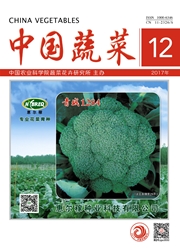

 中文摘要:
中文摘要:
以普通白菜品种改良京春绿、七宝青、上海抗热605及羽衣甘蓝品种东方绿嫩为试材,研究不同浓度海水(0-100%)对种子萌发、植株生长及其品质的影响。结果表明,供试的4种蔬菜中,改良京春绿耐盐能力最强,当相对海水浓度为40%-60%时,种子萌发率最高(100%),当相对海水浓度为80%时,种子萌发率仍达40%;当相对海水浓度为40%时,改良京春绿、七宝青、上海抗热605及东方绿嫩的可溶性蛋白质、VC、叶绿素(除上海抗热605外)和β-胡萝卜素含量均显著高于对照,可溶性蛋白质含量分别比对照提高了142.5%、99.2%、101.5%和117.5%,叶绿素含量分别比对照提高了59.0%、18.4%和16.8%,VC含量分别比对照提高了101.0%、75.9%、31.2%和5.2%,β-胡萝卜素含量分别比对照提高了77.8%、48.9%、77.5%和51.9%,表明一定浓度的海水可提高水培蔬菜的营养品质。
 英文摘要:
英文摘要:
The effects of different seawater concentrations on seed germination, growth and quality were studied in this paper, using 4 kinds of vegetables varieties, including three pakchoi (Brassica campestris L. var. communis Tsen et Lee ) varieties 'Gailiangjingchunlyu', 'Qihaoqing', and 'Shanghaikangre605', and one Kale (Brassica oleracea L. var. acephala DC. ) variety 'Dongfanglyunen' as experimental materials. The results showed that 'Gailiangjingchunlyu' has the strongest seawater-tolerance among these 4 vegetables. Its seed germination rate could reach 100% when seawater concentration was between 40% and 60%, and when seawater concentration reached to 80%, its seed germination rate could still reach 40%. When seawater concentration were 40%, the contents of soluble protein, chlorophyll ( except ' Shanghaikangre605' ), VC and β -carotene in these 4 vegetables were all higher than that of the contrust by 142.5%, 99.2%, 101.5% and 117.5% in soluble protein concentration, 59.0%, 18.4% and 16.8% in chlorophyll production, 101.0%, 75.9%, 31.2% and 5.2% in VC content, 77.8%, 48.9%, 77.5% and 51.9% in β-carotene content respectively. These results indicated that certain seawater concentration could improve the nutritional quality of vegetables.
 同期刊论文项目
同期刊论文项目
 同项目期刊论文
同项目期刊论文
 期刊信息
期刊信息
